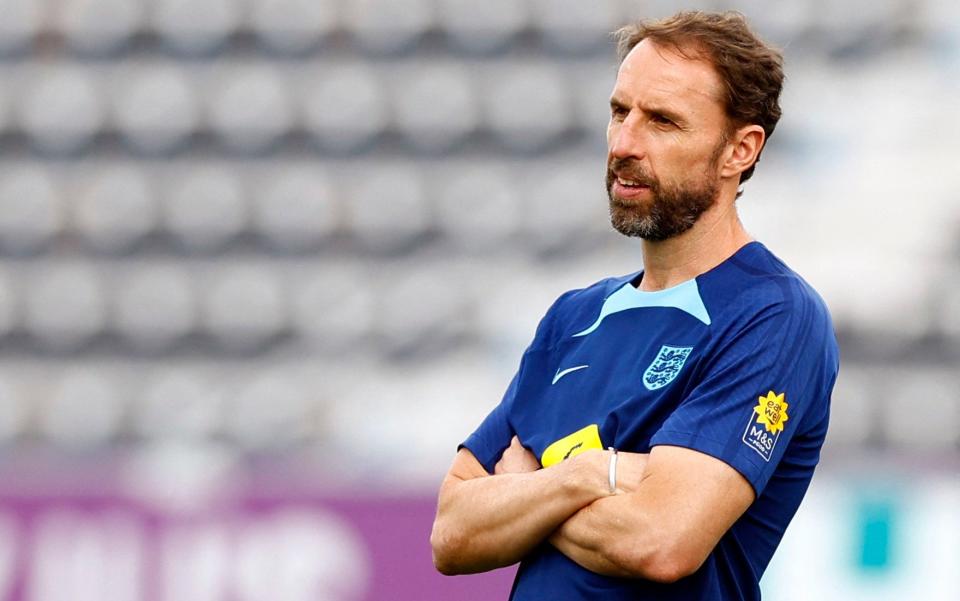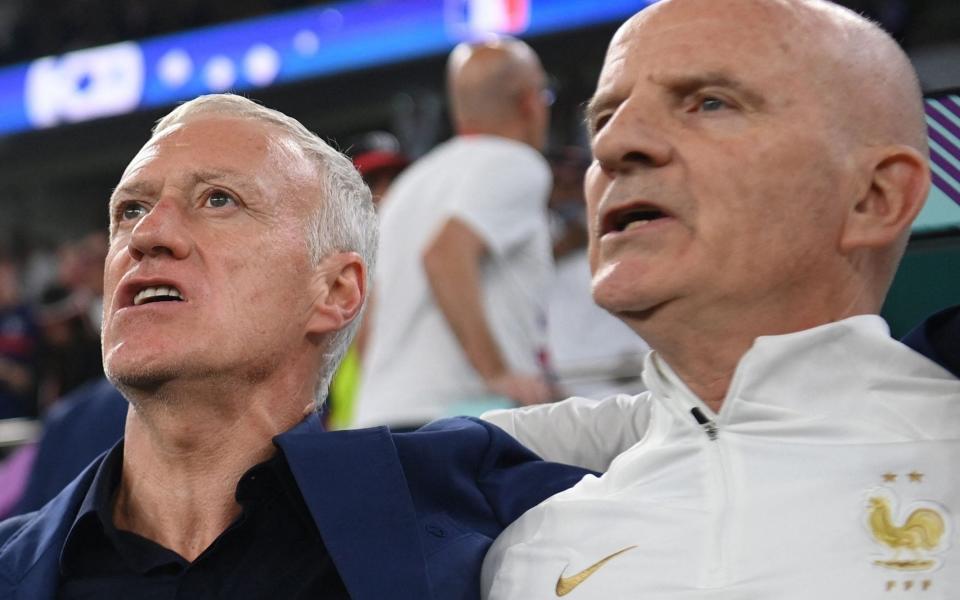England does not appreciate Gareth Southgate enough, says Didier Deschamps

Didier Deschamps, the France head coach, has given his support to Gareth Southgate and insists the England manager is not given enough respect in his own country ahead of meeting him on Saturday in the World Cup quarter-final.
Southgate faced criticism and jeers from supporters during the summer when his team failed to win a Nations League match but he has guided them to the last eight in Qatar and has the latter stages in his sights for a third successive tournament.
Deschamps, who beat Southgate as a player in the FA Cup final in 2000, has spoken to his counterpart away from the technical area and believes his work over the last six years is underappreciated.
“I very much like Gareth,” said Deschamps. “We’ve met on a number of occasions. We’ve talked on a number of things. If I have understood correctly, not everyone respects him so much in his own country. But he had a long and distinguished career and he’s also a very good coach. He has enabled England to get some very good results over the years and I very much like him.”
After Deschamps won the World Cup four years ago, French Football Federation president Noël Le Graët has been interviewed saying he hopes the former Chelsea midfielder will stay beyond the current tournament even with Zinedine Zidane currently available. Southgate has a contract until the next European Championship and Deschamps says his opponents do not have a weakness.
“They don’t have any [weaknesses], all teams have strengths, not all have too many weaknesses, only some slightly less strong points,” he said. “They have had the opportunity to see us play in four matches even though the third may not be too useful for them. At the end of the day you also need to make slight changes here and there and recognise slight weaknesses of opponents, areas you can work on.”
Deschamps has highlighted England’s set-pieces as an area of strength for Southgate’s team, along with their pace. But he also has Kylian Mbappé’s speed to cause England trouble.
“I am sure England will have prepared to face Kylian as our previous opponents did but Kylian is in the position to make the difference and even in the last match where he didn’t show his top form he was still decisive,” said Deschamps. “We have other players that can be dangerous as well and that helps us not be over dependent on Kylian. But Kylian is Kylian and he has that capacity to make the difference.”
Meanwhile, France captain Hugo Lloris has blasted back at suggestions he is the weak link in the world champions’ team.
“I will do my talking on the pitch,” he said. “We don’t need any extra motivation from outside to play a quarter-final of the World Cup.
The Tottenham goalkeeper plays against Harry Kane in training on a daily basis but says reading a penalty from his club team-mate is impossible.
“Harry has the ability to shoot anywhere, on my right, my left, the middle,” he said. “He is one of the best in this aspect of the game but for Harry and the other players there will be analysis on penalties, then it is all about feeling, about instinct that you get in the match but before to arrive in the shootout there is the time to make the difference on the pitch. We have to be ready for any scenario.”
Deschamps the ‘all or nothing guy’ three wins away from footballing immortality
It was shortly after Didier Deschamps had joined only Franz Beckenbauer in the most elite club in football – a World Cup winner as both captain and coach – that the guard came down.
The Parisian newspaper wanted to understand what lay beneath this understated 5ft 9in giant of world football who, having won everything that mattered as a player, had just scaled the ultimate summit as a manager.
And so they talked about Deschamps’s late brother, Philippe, who died in an aeroplane crash when a young Didier was just 19. Deschamps was asked whether success had gone some way to “soothing” the wounds. “No, it does not compensate for what I experienced,” he said. “These wounds are indelible. They stay. Time passes but it's something that we cannot forget. There were such painful traces… but we continue to live. It definitely gives me more strength. Life takes people away from us, but it gives us even more unsuspected strengths.
“I have a professional destiny, because life has not always been easy. I do everything to go as high as possible and give myself all the means to succeed.”
Deschamps then revealed that on the mornings both of July 12 1998 and July 15 2018 – his victorious World Cup finals two decades apart – he had woken with the feeling that France would prevail. “Yes, I knew that a little before,” he said. “It is written. It's fate. Destiny is written. It had to happen and it happened.”
Deschamps did then stress that you must do everything in your power to realise those opportunities but it is an outlook still which does help explain his confidence and inner peace at even the most intense moments.

Two of his closest confidants are Marcel Desailly, who played with him back when they were children at Nantes before representing the same Marseille, Chelsea and France teams, and his long-time France assistant Guy Stéphan. Look carefully when La Marseillaise is boomed out at the Al Bayt Stadium on Saturday and you will see Deschamps and Stéphan, a bald no-nonsense figure, singing passionately arm in arm.
Desailly, who has been working in Qatar with Bein Sports, says that Deschamps is an “all or nothing guy” who is usually a step ahead of what other people are thinking. “Didier cannot do anything half-heartedly,” says Desailly. “He has the obsession, the love of the game that every manager needs to be successful.”
Stéphan sees a manager who is “very serene” in Qatar and employing all his past experience to overcome considerable pre-tournament obstacles following injuries to N’Golo Kanté, Paul Pogba and Karim Benzema.
“He has prepared this World Cup very well and has been able to anticipate what he wants to do exactly,” says Stéphan. “He knew what he wanted to do from the get go. That is the experience he has with all the competitions he has done and that is the experience he lends to the team.”

ESPN’s French football expert Julien Laurens senses a much happier spirit than at last summer’s European Championship when the French team was based in Hungary.
Oliveir Giroud, the striker, said that playing the Euros at a time when there were still so many Covid restrictions was “weird” and the atmosphere inside their luxurious Doha hotel, the Al-Messila Resort, is reported to be far more relaxed and joyful. “Playing at this World Cup is freedom, fresh air,” said Giroud, who says that Deschamps has been speaking constantly to the players. “Maybe that didn’t happen as much during the Euros,” added Giroud. “The closer we get to the match he is really exchanging ideas with the players. He has not changed a lot. He still has the same desire to win.”
Antoine Griezmann and Youssouf Fofana are apparently the main DJs in a games room where [Gala’s] Freed from Desire has become something of an anthem between games of pool, table football and even piano lessons with Axel Disasi, who taught himself to play during lockdown. In their rooms, the players have French television streamed in but also a dedicated channel which is currently streaming carefully selected clips of the England team.
Laurens identifies Deschamps’ man-management as a particular strength, especially in the context of his stature in the eyes of many of the France team who were children when they saw his generation win the World Cup.
“He a lot of charisma, a lot of personality,” says Laurens. “He’s serious but also a joker – teasing people. You always feel good when you are with him, whether you are a player, journalist or friend.
“He never panics. Sometimes he makes wrong decisions but he is always composed, like as a player. He also understands how everything works – whether it is the media or agents – and is good at creating squads that will be harmonious if they were together for five or six weeks.”

Deschamps’ handling of Mbappé has been instructive. The striker had told the French Football Federation that he did not want to play for France after receiving racist abuse on social media last summer but is now revelling in the desert spotlight. During Sunday’s masterclass against Poland, it was noticeable that Mbappé lost the ball several times while trying extravagant flicks and backheels but that Deschamps never once wavered on the touchline in encouraging his most talented player to express himself. He was then of course rewarded with two wonderful goals.
Laurens describes Deschamps as a “conservative, Italian coach” at heart following his long experience as a player at Juventus but says that he is more astute tactically than often appreciated. Examples at this World Cup include the way in which Antoine Griezmann has been repositioned to thrive as an attacking midfielder and the rehabilitation of Adrien Rabiot at the team’s heart. Rabiot refused to go on the France standby list at the 2018 World Cup, a decision described by Deschamps as a “huge mistake”, but he was invited back into the squad in 2020 after two years in exile and has been crucial in the absence of Kanté and Pogba.
Griezmann even declared his “love” for Deschamps earlier in the tournament and was strikingly personal in describing his current motivations. “I give everything for the jersey, France, but also for him,” he said. “Every match, every action, it's like a thank you that I send him.”
Deschamps believes that having a son [Dylan] of a similar age to the players has helped him connect with this generation even if there has been signs of tension at this tournament with Benjamin Pavard, a player he pointedly described as not in “the right disposition” after the opening match with Australia. “If I don’t like a player I don’t select them for the squad in the first place,” said Deschamps. “You need to like their footballing ability, but get to know them as a person, the way that they think.
“I’m a coach but also a human-being. I’m not there to be their father, brother, grandfather, but I do have a relation of trust. I am there to protect them if they need that. I can still be frank with them if I need to. Even if I say things unpleasant sometimes, or give them advice that they might not appreciate, it’s for their own good.”
Deschamps says that successes in football belong to the players but that responsibility for bad results is “95 per cent” with the coach and, to that end, his longer-term future may well hinge on Saturday’s match. This will be Deschamps’ fifth major tournament as France manager and there were calls for his departure after an unexpectedly early Euro 2020 exit. His contract expires at the end of this World Cup but his relationship with Noël Le Graët, the president of the French Football Federation, is strong and they will spend together in Guingamp to debrief and decide what comes next.
By next Sunday, Deschamps could be the first post-War manager to win back-to-back World Cups. The spectre of Zinedine Zidane of course looms large but, if there is one lesson from a career that stands comparison with any in football history, it is that Deschamps should never be underestimated.

 Yahoo Movies
Yahoo Movies 